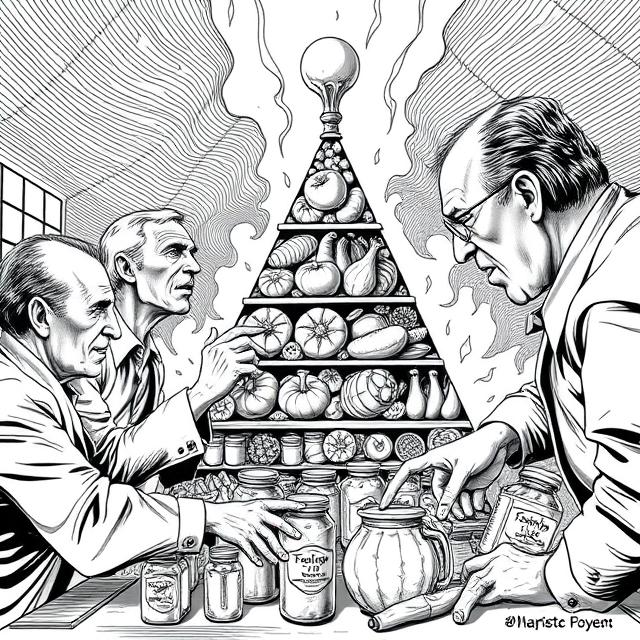
How the U.S. Government and Food Industry Rewired Your Diet for Profit
Table of Contents
Introduction: The Inversion of Nutritional Truth
What if the foundation of your diet—the advice given to your parents, written into textbooks, and reinforced by medical professionals—was built on lies? Lies not of simple error, but of calculated policy, industrial gain, and institutional cowardice. This is not a conspiracy theory. This is the documented, data-backed unraveling of the American nutritional narrative.
The Ancient Role of Fat in Human Evolution
Human beings evolved as fat-seeking creatures. Our ancestors thrived not on grains or fruit, but on fatty meat, bone marrow, and organ meats. The brain—60% fat by dry weight—demands high-quality dietary fat, especially omega-3s and saturated fats, for development and function.
“Fat, not carbohydrate, is the ancestral fuel of Homo sapiens.”
— Weston A. Price Foundation
Early humans prioritized fatty animals like mammoths and aurochs. The ketogenic-like state produced by high-fat, low-carb consumption fueled long-term energy, mental clarity, and reproductive health. Grains and sugars appeared only in agricultural societies—and with them came tooth decay, shorter stature, and metabolic disease.
The Engineered War on Fat
During the Great Depression and WWII, butter, lard, and tallow were rationed. The U.S. government, influenced by wartime economics, began subsidizing cheap, high-yield crops like corn and soy.
Instead of confronting the issue of scarcity, the USDA reframed fat as the villain. Margarine was praised, butter vilified. Fat-rich foods were portrayed as luxuries for the elite or enemies of the common man.
“The vilification of fat was not a scientific conclusion—it was a political decision.”
The Butter Shortage and Wartime Carbohydrate Push
Soybeans and corn were abundant, storable, and government-backed. Seed oils replaced traditional fats. Bread, cereals, and pasta became dietary cornerstones. The USDA’s “Basic Seven” food guide heavily emphasized grains, nearly eliminating mention of fat.
Source: Food Politics by Marion Nestle (2002)
Ancel Keys and the Scientific Sleight of Hand
In the 1950s, Ancel Keys presented the Seven Countries Study, linking saturated fat to heart disease. But it was junk science: Keys cherry-picked data and ignored nations that contradicted his theory.
His work was eagerly embraced by food corporations and government agencies that needed a scapegoat for postwar heart disease. Sugar, which had increased dramatically, was conveniently exonerated.
Source: The Sugar Conspiracy (JAMA, 2016)
How Big Food Hijacked the American Plate
Seed oils like soybean and canola oil became dominant due to low cost and long shelf life. These oils were industrial byproducts—never intended for human consumption until hydrogenation made them marketable.
By 1977, the USDA’s Dietary Guidelines promoted a high-carb, low-fat diet with full institutional backing. Food companies adjusted quickly: low-fat yogurts, sugary cereals, and margarine flooded shelves.
“These guidelines were never proven safe. They were assumed safe.”
— Gary Taubes, Good Calories, Bad Calories
The Low-Fat Boom and the Obesity Crisis
Between 1980 and 2000, low-fat foods dominated. But removing fat required replacing it with something else: usually sugar, maltodextrin, and corn syrup. The result?
- Obesity tripled
- Type 2 diabetes exploded
- Metabolic syndrome became the new norm
The body stores excess sugar as fat, primarily visceral fat—the most dangerous kind. Chronically elevated insulin levels, driven by carb-heavy diets, became the silent pandemic.
Source: WHO Obesity Trends, CDC Diabetes Surveillance
The Silencing of Scientific Dissent
Yudkin’s Pure, White, and Deadly was ridiculed. Framingham Heart Study findings that disproved the fat-heart link were ignored. Scientists who challenged the narrative found themselves defunded, unpublished, and professionally exiled.
“You could not get a paper published without toeing the anti-fat line.”—Dr. Zoe Harcombe
Sugar: A Metabolic Wrecking Ball
Sugar is not just empty calories. It is a metabolic disruptor that:
- Elevates insulin chronically (hyperinsulinemia)
- Increases liver fat and triglycerides
- Damages endothelial function (precursor to heart disease)
- Feeds harmful gut bacteria and contributes to leaky gut
- Fuels advanced glycation end-products (AGEs), aging tissues prematurely
Fructose, found in high-fructose corn syrup, is metabolized like alcohol—overloading the liver and generating visceral fat.
Source: Lustig, R. Fat Chance (2012)
Fat: The Essential Nutrient for Hormonal and Brain Health
Dietary fat is not only safe—it is essential. Fat enables:
- Hormone synthesis (testosterone, estrogen, cortisol)
- Cell membrane integrity
- Absorption of fat-soluble vitamins (A, D, E, K)
- Brain myelination and neurotransmitter balance
Ketones, the byproduct of fat metabolism, are clean-burning fuel for the brain and may protect against neurodegeneration.
“The brain prefers ketones in times of stress, fasting, or intense focus.”—Harvard Medical School Neurobiology Division
Why the Nutrition Lie Still Persists
- Institutional momentum: Bureaucracies avoid admitting error.
- Corporate funding: The food industry bankrolls research to support profitable narratives.
- Cultural entrenchment: “Fat makes you fat” is easy to teach, hard to unlearn.
- Medical curriculum: Doctors receive <20 hours of nutrition education—mostly outdated.
Breaking Free: What Science Actually Supports
Eat:
- Pasture-raised eggs
- Grass-fed ruminant meat
- Organ meats (liver, heart, kidney)
- Raw dairy (if tolerated)
- Wild-caught fatty fish
- Extra-virgin olive oil, butter, ghee, tallow
Avoid:
- All industrial seed oils
- Refined sugar and corn syrup
- Ultra-processed snacks, cereals, and “meal replacements”
- Artificial sweeteners and low-fat impostors
Fat doesn’t make you fat. Sugar makes you sick.
Further Reading and Final Reflections
Recommended Books:
- The Big Fat Surprise — Nina Teicholz
- Good Calories, Bad Calories — Gary Taubes
- The Case Against Sugar — Gary Taubes
- Fat Chance — Robert Lustig
Final Word:
This lie wasn’t accidental. It was profitable. But your metabolism, your brain, your future — are too precious to sacrifice to outdated dogma. Unlearn the lie. Eat for truth.
“You are not broken. Your diet was.”